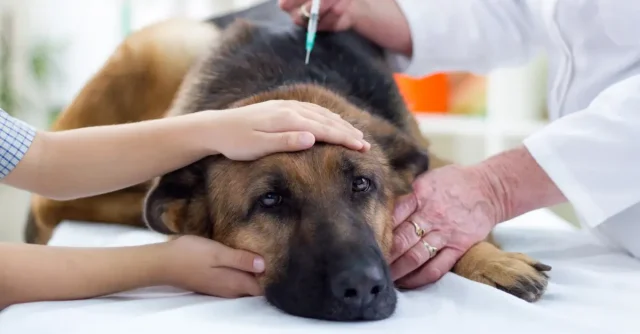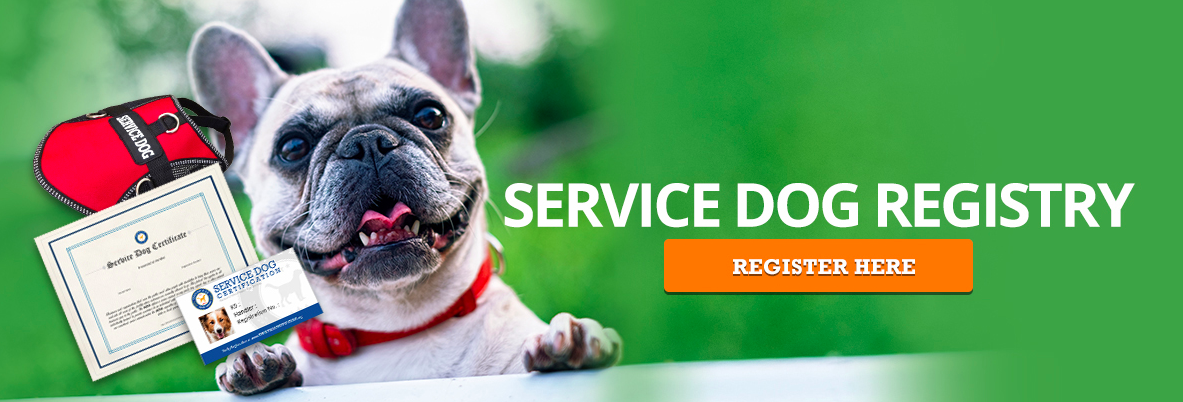Should I Vaccinate My Service Dog?

Yes, you should vaccinate your service dog, as they are required by many state and local laws to be vaccinated, just like a pet dog. Additionally, vaccinations like rabies are required for air travel. Just because your dog is a service dog does not exempt them from vaccinations, unlike it does for pet fees and deposits when you rent an apartment or no-dogs-allowed rules in restaurants.
In this article:
- ADA requirements
- Airline vaccine requirements
- Housing vaccine requirements
- Dog vaccine efficacy
- Core vaccines for service dogs
ADA Vaccine Requirements for Service Dogs
Your service dog gets to go places other dogs can’t and is exempt from a lot of rules (like no pets in the store), but state health laws still apply. The official ADA guidance backs this up: “Require service dogs to be licensed and vaccinated, if all dogs are required to be licensed and vaccinated.”
Most states require dogs to be vaccinated. In Texas, every dog is required by law to have a current rabies vaccine; the owner must obtain it by 4 months of age. In California, dogs need rabies shots by 3 months of age and must be licensed before 5 months old. Your service dog doesn’t get special treatment here.
Beyond legal requirements, vaccines protect your working partnership in practical ways. An unvaccinated dog who gets sick can’t perform their service dog tasks. You lose your independence while they recover.
Vet bills for vaccine-preventable diseases often cost thousands. Parvovirus treatment averages upward of $5,000 if your dog survives. Compare that to a $30 vaccine. Even with pet insurance, you’re facing deductibles and time off work while your dog is hospitalized.
Vaccines give you peace of mind. Your dog can safely work in public without you constantly worrying about disease exposure. You can focus on your tasks instead of scanning every environment for health threats.
Airline Vaccine Requirements
You can’t fly with a service dog unless they have been vaccinated. When flying with a service dog, airlines will have you submit the DOT’s Service Animal Air Transportation Form. On the form, you’re required to confirm your dog has had its rabies vaccination and also include the contact information for your veterinarian.
You sign that DOT form under penalty of federal law. Lie about vaccines and face severe fines. Airlines also require the paperwork 48 hours in advance. Last-minute travel can become impossible with expired shots.
American Airlines states clearly: “Only service dogs meeting CDC U.S. vaccination requirements are allowed.” Delta won’t budge either: “All traveling service animals must be fully vaccinated.”
Check your dog’s rabies certificate right now. When does it expire? Put that date in your phone with a 30-day warning so you don’t have issues travelling, especially in emergencies.
Housing Vaccine Requirements
Your service dog gets to live with you for free. No pet deposits. No breed bans. No size limits. That’s the Fair Housing Act working for you.
But HUD doesn’t waive health requirements. Landlords can still ask for current rabies certificates if local law requires them. While HUD doesn’t specifically require vaccinations, landlords can take reasonable steps to ensure tenant animals don’t pose health threats.
Another thing to keep in mind is that, in the unlikely event that your service dog ever bites someone and is not up to date on its vaccines, quarantine rules will take effect immediately. Some places require euthanasia for unvaccinated dogs in serious bite cases. Your housing protections won’t help then.
Vaccine Efficacy in Service Dogs
Your vet recommends vaccines because they prevent diseases that end working careers. The research backing this up is solid.
Scientists tested giving dogs multiple vaccines at once, including rabies and the combination shot that your service dog receives. They worried the vaccines might interfere with each other. They didn’t. Every dog in the study developed complete protection against all diseases. The researchers were measuring actual antibody levels, not just hoping the shots worked.
Dogs receiving multiple vaccines simultaneously had the same strong immunity as dogs receiving the same vaccines separately. Your service dog isn’t getting weaker protection by getting several vaccines in one visit.
Rabies vaccine research tells an even better story. Scientists found that less than 5% of rabid dogs had ever been vaccinated. That means over 95% of vaccinated dogs stayed protected even when exposed to rabies. The few breakthrough cases usually happened in dogs with compromised immune systems.
More interesting, dogs with expired rabies vaccines still had some protection if they’d been vaccinated before. Their immune systems remembered the threat. This doesn’t mean you can skip boosters, but it shows how well vaccines train your dog’s immune system.
A 40-year review of dog vaccine development found that modern vaccines create two types of protection. Antibodies patrol the bloodstream looking for viruses. Special immune cells destroy any infected cells they find. Both systems remember threats for years.
The review also confirmed something important: “Routine vaccines are highly effective, so the risk of properly vaccinated animals contracting these diseases is very low.” UC Davis researchers tested how long immunity actually lasts. They found that protection often extends well beyond the label dates. Some dogs still had strong immunity three years after their last shot.

Core Vaccines Every Service Dog Needs
Rabies vaccine is legally required almost everywhere. Only Hawaii has no statewide rabies law, and that’s because they have no rabies. Most everywhere else mandates this shot.
Your puppy gets their first rabies vaccine at 16 weeks. Then your state determines the schedule. Some require yearly boosters. Others allow three-year vaccines after the first annual booster. The vaccine label and local law control timing, not your preference.
Rabies kills everything it infects. The virus travels from a bite wound to the brain through nerve pathways. Once it reaches the brain, death is nearly inevitable. There’s no cure. Even mild exposure through a scratch can be fatal if the animal was rabid.
Your service dog is actually at higher risk than pet dogs. You’re in public constantly. They may encounter stray cats in parking lots. Or that “friendly” dog that approaches yours might be in the early stages of rabies, when behavior changes begin.
DHPP combination vaccines prevent four diseases that historically killed thousands of dogs each year. Veterinarians consider this absolutely essential for every dog, working or not.
Distemper attacks multiple body systems at once. The virus initially targets the respiratory tract, causing coughing and fever. Then it moves to the digestive system, causing vomiting and diarrhea. Finally, it reaches the nervous system. Dogs develop seizures, paralysis, and brain damage. About half of the infected dogs die. The survivors often have permanent neurological problems that end working careers.
Hepatitis comes from canine adenovirus-1. This virus primarily targets the liver but can spread to the kidneys, lungs, and eyes. Young dogs often die within hours of showing symptoms. Older dogs might survive but develop chronic liver problems. Even mild cases can cause “blue eye” — corneal swelling that affects vision permanently.
Parvovirus specifically attacks rapidly dividing cells. In puppies, that means the intestinal lining and heart muscle. The intestinal damage causes severe bloody diarrhea and vomiting. Dogs can lose dangerous amounts of fluid in hours. Even with aggressive treatment costing thousands of dollars, many dogs die. Service dog programs consider parvo exposure grounds for immediate medical retirement.
Parainfluenza contributes to the kennel cough complex along with other viruses and bacteria. While rarely fatal on its own, it weakens dogs’ respiratory defenses. Your service dog encounters more potential sources than pet dogs, such as in airplane cabins, crowded hotels, and busy stores where sick people cough.
Puppy vaccine series follows a different schedule from adult boosters. Young service dogs start DHPP vaccines at 6-8 weeks old, then every 2-4 weeks until they’re 16 weeks old. This timing matters because maternal antibodies interfere with vaccines initially but fade at different rates.
Each puppy loses its mom’s protection at a different age. Some are vulnerable at 8 weeks. Others stay protected until 14 weeks. The multiple shots ensure your puppy develops their own immunity, regardless of when maternal antibodies disappear.
Adult dogs with unknown vaccine history get treated like puppies. They need the whole series to ensure adequate protection. Don’t assume an adult rescue dog is protected just because they look healthy.
Medical Disclaimer: This article provides general information about service dog vaccinations and legal requirements. It should not replace professional veterinary advice. Every dog’s health needs are different. Always consult with a licensed veterinarian to determine the appropriate vaccination schedule and medical care for your specific service dog. Your veterinarian can assess your dog’s individual risk factors, health status, and local disease threats to create the best protection plan for your working partnership.
About the Author: The writing team at Service Dog Certifications is made up of folks who really know their stuff when it comes to disability laws and assistance animals. Many of our writers and editors have service dogs themselves and share insights from their own experiences. All of us have a passion for disability rights and animals.
2 comments
Leave a Reply Cancel reply
Latest Posts

Dangerous Materials Hiding in Your Dog Products
Jake’s German Shepherd began developing strange rashes around his collar. Three vet visits later, they figured out the leather was treated with chromium — a chemical that irritates sensitive skin. Jake had no idea his dog’s collar contained industrial chemicals. Most dog owners don’t know what goes into the products they buy. Many companies use […]

Read More

Can You Bring a Service Dog to a Basketball Game?
Yes, you absolutely can bring your service dog to basketball games. Whether you’re heading to your local high school tournament, a packed college rivalry game, or splurging on NBA tickets, the Americans with Disabilities Act protects your right to be accompanied by your service dog anywhere the public can go. When you arrive, venue employees […]

Read More

Best Pet Health Insurance Providers
If you own a pet, you know how important — and expensive — vet care can be. One way to offset those costs is to purchase pet health insurance. Like typical health insurance, pet insurance is available at many price points, and can cover all, most, or only some of your vet-related costs. It can […]

Read More

Can I ask (challenge) a service dog owner to show me valid proof of required vaccination and denny access to a public facility if the SD owner do not have so proof or refuses to show it.
That would not be a proper basis to deny a service dog owner access to a facility. You are allowed to ask two questions under the ADA: 1. Is the service dog required for a disability? and 2. What work or task has the dog been trained to perform? If you have evidence the dog poses safety or health risk to others, that may be grounds to deny accommodation.